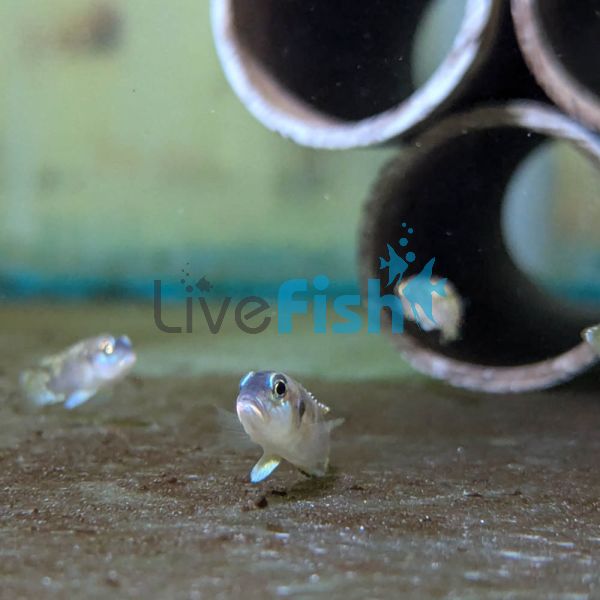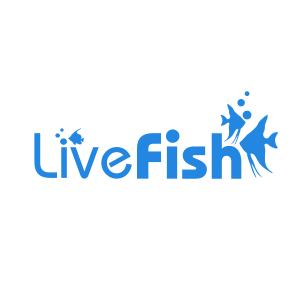Lamprologus Speciosus 3cm
Lamprologus speciosus, commonly known as the Black Ocellatus, is a captivating shell-dwelling cichlid endemic to Lake Tanganyika in the East. This adorable little species spends a vast majority of its life living within and around shells which is why it also earns the name gold shell dweller. Speciosus are one of the best beginner African cichlids because of their small size around 5cm and great for nano aquariums.
Lamprologus speciosus
Lamprologus speciosus, commonly known as the Black Ocellatus, is a captivating shell-dwelling cichlid endemic to Lake Tanganyika in the East. This adorable little species spends a vast majority of its life living within and around shells which is why it also earns the name gold shell dweller. Speciosus are one of the best beginner African cichlids because of their small size around 5cm and great for nano aquariums.
Lamprologus speciosus boasts a distinctive and attractive appearance. They exhibit a sleek, elongated body adorned with a silvery base colour, complemented by dark vertical bars along their flanks. A notable feature is the prominent black "eye spot" or ocellus on the dorsal fin, which serves as a deterrent to potential predators. One of the most loved aspects of these fish is their incredibly comical look, black Ocellatus have very large eyes and swim at a 45-degree angle on the sand bed most of the time. They are also great fish to breed in a colony because the parents take great care of the fry by keeping them safe in shells or hiding areas.
Telling males from females apart is difficult with these fish however it is best to get these cichlids in a colony and let them naturally pair off and breed. They will also maintain the colony according to space and food available meaning that massive overpopulation would not be an issue. Because they are usually kept in aquariums with lots of large shells the female will lay eggs within the shell and both parents will keep guard constantly going in and out of the shell to make sure the area is safe. In the wild, the Speciosus is found in Lake Tanganyika of Africa.
Tank Recommendations for your Lamprologus Speciosus
The gold occelatus is a very peaceful nano African cichlid and to really experience its behaviour it is usually best kept in a species only colony. They can be kept in nano aquariums with the minimum being a 70-litre system. A sand substrate would be best as they routinely sift through sand and large shells provide all aquascape requirements. Escargot shells are most used for this fish and are commonly found for sale online. The Speciosus also routinely change the aquascape, so it is best to keep it simple with a sand bed and a large assortment of shells which they change as per their needs.
Suitable Tank Buddies
Speciosus are a nano African cichlid and should be kept with species of a similar size or be kept entirely alone in a species only tank with other golds. They would be okay in a community of nano Tanganyikan cichlids and mixing species from different lakes should be avoided.
Usually Compatible
The Lamprologus Speciosus can be kept with other nano African cichlids such as julidochromis, other shell dweller species and calvus. However, mixing with other species does present the opportunity for fry to be eaten.
Sometimes Compatible
Medium-growing African cichlids such as xenotilapia, lemon cichlids, and Likoma cichlids. Essentially it is best to ensure any other African cichlid they are kept with small mouths to ensure they do not prey on ocellatus.
Rarely Compatible
Large African cichlids such as peacocks or haps as these would easily eat Speciosuss.
Feeding your Lamprolungus Speciosus
The Lamprologus black cichlid will take to aquarium foods very easily. They will eat a wide range of pellets, flakes, and frozen foods, which ensures that they have optimal nutrition.
The ideal diet would be good quality, small, and slow-sinking food, supplemented with green matter like algae flakes or sheets. Feeding any foods with natural colour enhancers would also be great as this will really enhance the yellowfin and stripes on this fish.
| Scientific Name | Lamprologus speciosus |
|---|---|
| Care Level | Easy |
| Common Names | Lamprologus Black, Black shell dweller, Black Occie |
| Diet | Herbivore |
| Fish Family | Cichlidae |
| Lifespan (years) | 8 |
| Max. Length (cm) | 5 |
| Min. Tank Volume (l) | 70 |
| Origin | Africa |
| Sociability | Peaceful |
| Venomous | No |
| Water Conditions | 24-26° C, pH 8.0-8.5 |
| Plant Safe | With Caution |




